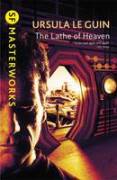The Lathe of Heaven, Ursula K Le Guin (1971)
Review by Megan AM
One of the most radical, yet unradical, ways of thinking.
Fundamentally paradoxical, yet still, fundamental.
Both the thesis and antithesis for change.
(One of most difficult concepts to teach to a classroom of 9th graders scratching themselves in their uniforms on that one day of the year when state-mandated teaching objectives cross into the territory of “Eastern Philosophy.”)
The Tao. The Way.
George Orr is the embodiment of The Way.
In The Lathe of Heaven, George Orr visits a therapist to deal with his lifelong problem of affecting reality with his dreams, what he calls “effective dreaming”. But when the landscape of reality starts changing, steady Orr is not sure he can trust the ambitious Dr. Haber with his powerful mind. Can a passive, compliant person like Orr take back control of his dreams, and reset the world?
The dualism of personality, symbolized in the style of a PKD novel.
But, really, a celebration of a particular personality.
At first, it may seem like a tale about two undesirable opposites, vain wit versus witless passivity. Le Guin pulls no punches with her quarry, the arrogant therapist Dr. Haber, who was “no being, only layers” [81], and who “was not… really sure that anyone else existed, and wanted to prove they did by helping them” (p 28)
(Ouch, says the woman who practices the same profession.)
But Le Guin also drops a few judgmental remarks on her protagonist Orr, who is “unaggressive, placid, milquetoast…” (p 7), and “meek, mild, stuttering” (p 42). George Orr is “like a block of wood not carved” (p 96).
But it turns out Le Guin likes blocks of wood. And so does Lao Tzu:
The way goes on forever nameless.
Uncut wood, nothing important,
yet nobody under heaven
dare try to carve it.[“Sacred Power,” Lao Tzu: Tao Te Ching: A Book about the Way and the Power of the Way by Ursula Le Guin, p. 48]
In the notes of her demystified translation of the Tao Te Ching (2009), Le Guin expounds on that “block of wood”:
Uncut wood – here likened to the human soul—the uncut, unearned, unshaped, unpolished, native, natural stuff is better than anything that can be made out of it. Anything done to it deforms and lessens it. Its potentiality is infinite. Its uses are trivial. (p 83)
Not an attack on the passive personality. This is the celebration, perhaps exploration, of one. A personification of The Tao.
There’s other good stuff, too. Le Guin, as always, is funny, with “enhuging” and “enreddenhuged” being only two examples of hilarious attempts at short and concise, Tao-like humor. She also addresses vainglorious ambition, the expert pretense of therapy, Orwellian dystopia, PKD-style wibble-wobble of dreaming, interracial relationships, the gray tedium of an ethnic melting pot, among other things.
But The Lathe of Heaven also arouses curiosity about Le Guin’s lifelong relationship to Taoism. A woman who tells it like it is, who dissects books with an unforgiving blade, who unleashes snappy comebacks at fellow authors, and who turns humble acceptance speeches into defiant criticism. Ursula Le Guin is no George Orr.
But The Lathe of Heaven is a lot like The Tao.
Simple. Short. Sweet. Funny.
Mystical and whole.
Like the stanzas of a Tao verse.
This review originally appeared on From couch to moon.


 The Lathe of Heaven, Ursula K Le Guin (1976)
The Lathe of Heaven, Ursula K Le Guin (1976)